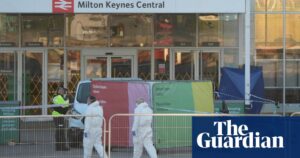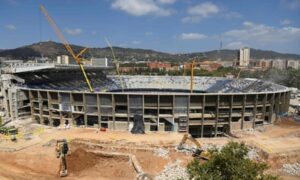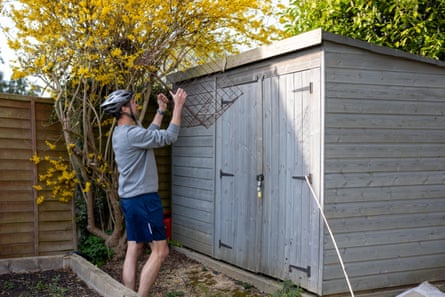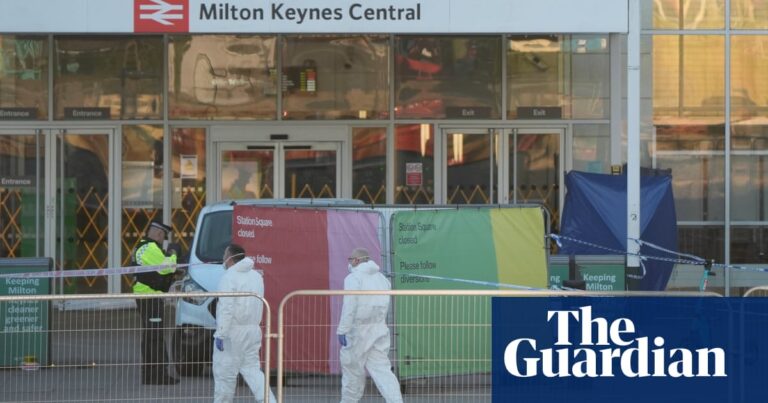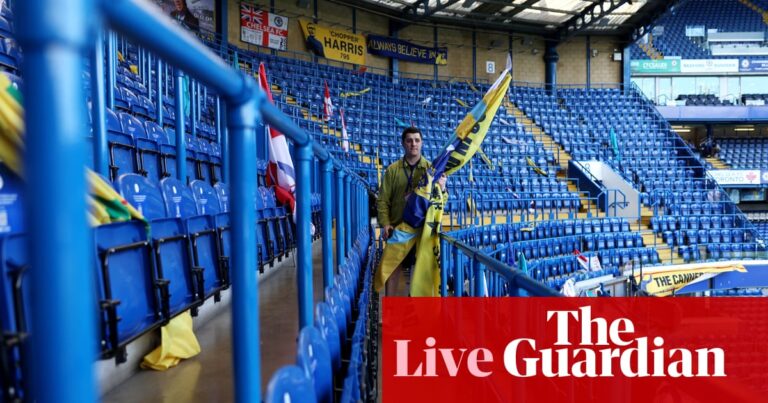I
In the early morning of October 25th, Josefina Maldonado, a grandmother in her 60s living in the Renacimiento district of Acapulco, witnessed the strong winds of 165mph (270km/h) tear off the corrugated metal roof of her home. This left her family, including two young children, vulnerable to the heavy rain and destruction of the hurricane. Almost all of their belongings, including furniture and beds, were carried away by the storm.
Maldonado explains that it wasn’t a matter of the wind or water being more powerful. They were both working in tandem. Throughout the entire night, they worked tirelessly to salvage what they could, while the children wailed and sobbed for hours.
The Pacific coast of Mexico was struck by Hurricane Otis, causing severe damage to over 200,000 residences and resulting in the loss of at least 45 lives. It is widely acknowledged that the failure to anticipate its strength was a major flaw in meteorological forecasting. Despite being classified as a category 1 storm by the United States National Hurricane Center two days before reaching land, it was later upgraded to a category 5 just hours before making landfall. This left little time for residents of Acapulco to evacuate.
As stated by the center, the current climate emergency has caused changes in water temperatures in the Pacific region, increasing the likelihood of rapid accelerations.
After the storm, inhabitants of Renacimiento gathered up debris such as refrigerators, mattresses, and children’s tricycles using scavenged rakes and shovels. This created a clear path for pedestrians to navigate through the destroyed properties.
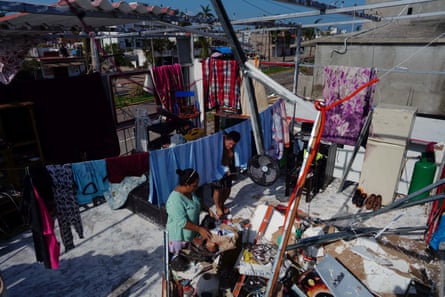
Maldonado was unable to locate any of her furniture in the wreckage. She had to stand in line at the entrance of the area, waiting for a military vehicle to bring water. The following day, she and other residents finally received enough water in containers to sustain her family for several days.
Maldonado states that they have not received much assistance and would have to procure their own food, medicine, and other necessary items.
48 hours after the storm, locals were informed that marines would distribute canned beans, rice, and cookies to households in a nearby area. However, a large group had already assembled and it was evident that there were not enough provisions for everyone.
According to Maldonado, a conflict broke out among people over the food, beginning with shouting and escalating to physical altercations such as pushing and punching. The marines then withdrew and ceased distributing the food.
Numerous citizens were forced to depend on assistance from wealthier individuals living nearby. After the storm had passed and the primary roads were cleared, a crisis economy emerged, with inflated prices that were two or three times higher than usual. Unfortunately, many residents were left without any money. As a result, some required aid in order to take shared taxi rides to locations up to an hour away, where they had heard they could obtain food.
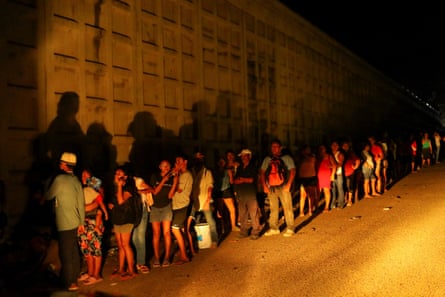
Although wealthy individuals in the city’s hotel districts had the means to evacuate, there were concerns among those living in the working-class neighborhoods, which supply labor to the tourist areas. They feared they would lose whatever possessions they had if they were to leave. Additionally, while they had the opportunity to take free buses to the nearby state capital of Chilpancingo, they only had enough funds to sustain themselves for a limited period of time.
Maldonado explains that although everyone needs to return to work, the jobs are no longer available due to the damaged buildings and missing walls.
Initial evaluations from local officials, disclosed on Thursday, indicate that the hurricane caused damage to approximately 80% of Acapulco’s hotels. This would have a detrimental effect on the economy of the area, which is a popular destination for international tourists and located in one of Mexico’s most impoverished states.
The cost of rebuilding Acapulco, according to the Mexican government, is estimated to be 61 billion pesos (£2.8 billion). Many influential politicians from the ruling Morena party have pledged to contribute a month’s salary to the fund. The government has also provided 20,000 food parcels and 200,000 liters of water to Acapulco. Despite this aid, a large number of residents have chosen to stay in the city, and temperatures have risen back up to 32C following the storm.
Ariadna Montiel Reyes, the secretary of welfare, announced on Monday that the government is committed to assisting those whose homes have been damaged. She also stated that the number of locations providing aid will increase within the coming days.
ignore the advertisement for the newsletter
after newsletter promotion
Abdul Ramírez, a taxi driver, feels that promises like these are empty. He explains, “We’re just waiting for the government to show up. We’re not necessarily blaming them, but they’re not here.”
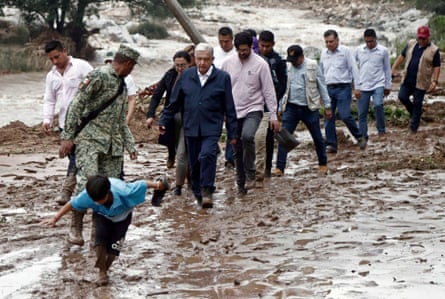
The president of the country, Andrés Manuel López Obrador, announced this week that the military will be responsible for distributing all humanitarian aid. This is to prevent any exploitation of people in need by non-governmental organizations and local governments. He also expressed optimism about the recovery efforts and wished for the people of Acapulco to have a merry Christmas.
In the La Colosio area, which also experienced significant destruction and flooding, individuals in dire need resorted to taking essential items from a nearby Walmart. Without access to the store, many would have faced starvation for several days due to the extensive flooding that isolated the district from the rest of the city.
The parking lot of the shop was covered in sprawling pieces of metal signs, fallen poles, and broken terracotta pots. However, a group of men managed to clear a path and break a window to gain entry. In just two days, all the shelves were emptied.
Laura Díaz, a general practitioner, recalls, “Upon our arrival, we found that all the regular food had been consumed and only candy remained. However, my husband reassured us by saying, ‘It’s alright, chocolate will provide us with energy!'”
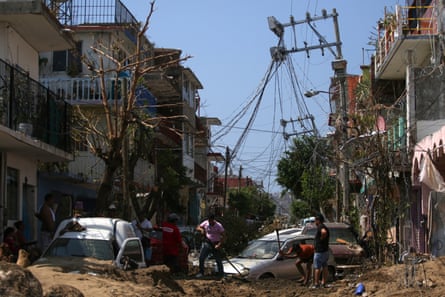
Due to a lack of gas supply, residents have resorted to cooking together using fires among the piles of trash. As of Sunday, October 29th, roads have been accessible, but the government has not yet provided any food or water to La Colosio, except for sporadic distribution of half-liter bottles by patrols of national guards.
As the city becomes crowded with surveyors holding clipboards and soldiers armed with automatic weapons, Maldonado has started to question why these individuals, who were supposed to provide aid, are not distributing essential resources like food and water. “This could be a trial from a higher power,” she muses. “Perhaps it is our punishment for something.”
Source: theguardian.com






